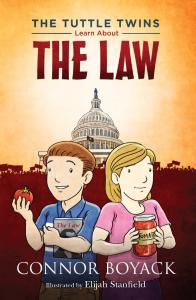As our kids get older, I find myself reading more and more books for children of a specific variety (i.e. aimed at education, rather than just the “generally for kids” books we read when they were younger). This includes books they’re reading in the public schools and books that are written for/known by homeschoolers. Apparently one such series well known by the latter crowd is “The Tuttle Twins,” and the first book in the series is The Tuttle Twins Learn About the Law.
The short version: this is an interesting book that does some things right and might be an okay place to start talking to your kids about government, but that fundamentally misunderstands what government does and what the law is for.
The titular Tuttle Twins are given homework to talk to an older member of the community to learn about wisdom. They talk to their neighbor “Fred”, who in turn teaches them about government. So far so good. Specifically, he tells the kids that government is organized to protect our rights and our property, and to stop those who would violate the former and steal the latter. Now there’s more to government than that, but again this is a perfectly reasonable starting place.
The Fred complicates things by pointing out that sometimes the bad guys aren’t just out there in the world violating our rights and stealing our stuff, sometimes they’re in government as well. At times, the government is the bad guy. Again, fair enough. Anyone who doesn’t have room for this in their view of politics has a deficient view of politics. And sometimes the government is the bad guy when the people in government take things from us for the benefit of their friends, or themselves. This is called “graft”, and the book is entirely right to point it that it happens and that it’s wrong. (Though it’s not terribly common in the United States.) And that’s why all taxation is theft.
Wait, what? Okay, the book doesn’t quite make that jump. Instead, it notes that sometimes governments take things from us and give them to other people. And at this point it’s not talking about graft, and though the things like “welfare” or “Medicaid” or “salaries for firefighters” are never mentioned, those are clearly in view. When this happens, so the book claims, it turns people against each other and makes people just want to use the government to live off of instead of working themselves. And while that last point is a legitimate problem, the real issue comes in the first point. Specifically, the book says “‘If a law lets the government do something I’m not allowed to do, then it’s not a true law,’ Fred said.”
This, frankly, is nuts. The government can do all sorts of things that I can’t do as an individual–and taxing others is just one of those things. Others might include printing money, forming treaties, declaring war, building a prison system and incarcerating criminals, holding a trial, holding an election for public office, etc etc etc. There are good definitions of “true laws” out here (Aquinas is a good place to start), but this isn’t one of them. And while I get that ideas like “legitimacy,” “representative democracy”, and “consent” are probably too complex for a children’s book, that doesn’t mean we have to run the other way to oversimplify so much we fail to arrive at anything useful. Even a child can understand that arresting someone, putting them on trial, and punishing them is a legitimate function of the government and something I am not allowed to do myself.
I should also point out there’s a long tradition of Christian thought about this. Aquinas reflects on the law in the Summa Theologica, as does Calvin in book 4 of the Institutes. Some of the first public welfare programs were created by Christians, as were the first public schools (look up what Knox did for Scotland some time). These are all perfectly legitimate uses of government along the principles for believers laid down in Romans 13.
Again, this book does get some things right and does involve a clever way to go about learning the law. So start here if you like, but don’t end here. Be sure to expose your kids to the wider tradition–including the Christian tradition–of thinking about the law and politics.
Dr. Coyle Neal is co-host of the City of Man Podcast an Amazon Associate (which is linked in this blog), and an Associate Professor of Political Science at Southwest Baptist University in Bolivar, MO













